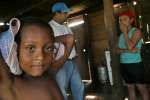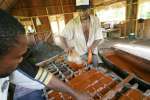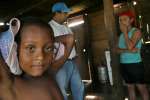UNHCR staff receives award for helping Colombia's forgotten people
News Stories, 17 March 2004

PASTO, Colombia (UNHCR) – For more than a year, Aldo Morales showed the displaced people of Nariño in south-western Colombia that they were not forgotten. So when it came time for him to leave, they showed him that he, too, would not be forgotten – by presenting him with two awards of appreciation.
In recognition of his outstanding contribution to the population displaced by violence in Nariño, the UNHCR field officer was awarded the Great Cross of the Order of the Governor's Office of Nariño, as well as the Order of Merit of San Juan de Pasto in the Rank of Commander by the Mayor of the City of Pasto in December 2003.
"All of the people of Nariño are grateful for the work done by UNHCR and especially by Aldo Morales, who are truly working on behalf of the displaced population in this Department," said Nariño's acting governor, Nubia Quintero.
Morales, who hails from Guatemala, helped open UNHCR's office in the Nariño city of Pasto in November 2002. Since then, the agency has carried out many projects to help the displaced people in that region. During the first half of 2003, for example, more than 32,000 people received birth certificates and cédulas (identity cards) through the Project for Identification and Registry to ensure the basic rights of Colombians displaced by violence. This project was implemented in more than 10 municipalities in the Department of Nariño.
In addition, some 1,300 people have received assistance from the Offices for Legal Counselling, a project that gives free comprehensive legal assistance to displaced people within the framework of an agreement with the University of Nariño and the Office of the Ombudsman.
Summing up his work in Nariño, Morales said, "UNHCR was able to foster a lasting commitment on the part of the Departmental authorities, international organisations and the local community on providing assistance to displaced people. For the first time, Nariño is thinking about developing a public policy on forced displacement. Assistance to displaced people is also being given priority in terms of social policy."
He feels that the most positive aspect of his work has been to reach previously-inaccessible areas. People felt that someone was with them, and he has no doubt that this was precisely what gave legitimacy to UNHCR's work there.
"Gaining everyone's respect was a great achievement," he said. "The work of UNHCR was always recognised and the safety of the team guaranteed, thanks to its apolitical and impartial attitude with respect to the armed groups."
Morales speaks from experience, having had a close shave with one of the illegal armed groups when he and his team were stopped along one of the roads in Nariño and held for 18 hours. "As I see it, this was a revealing experience because it made us feel fear as well as think about what we were doing. But at the same time, through this experience we learned about our responsibility."
For him, the most enriching experience was the way his work brought him into such close contact with the communities, "working with forgotten communities who saw in me the possibility of having someone at their side, such as in Barbacoas, where people could not believe that we were actually there, because they said nobody had ever come to Barbacoas."
Although he notes that the suffering of the displaced people has in fact worsened, he has not lost hope because he is convinced that the inhabitants of Nariño are an enterprising people who have shown courage and commitment.
Before leaving the Department in December, Morales expressed gratitude to his colleagues at UNHCR Pasto: "When you are in a field office, and especially when you have to coordinate activities, you have to understand that we all depend on one another. The key to success was to have a closer relationship with our colleagues."
He acknowledged he was leaving Nariño with mixed feelings. He was sad at leaving a place to which he has devoted so much effort and which he feels has opened its doors to him. But he was also happy to have made a difference and to know that people were aware of his efforts and will to endure.
He will now continue to work not only for the Department of Nariño but for all the people of Colombia. He will coordinate the Identification and Registry Project from Bogota, aimed at guaranteeing access to identity documents for the displaced population, along with those at risk of becoming displaced, and the Offices for Legal Counselling, a project that involves working jointly with universities in order to provide free legal advice for this sector of the population.
By Ana María Rodríguez
UNHCR Colombia











































